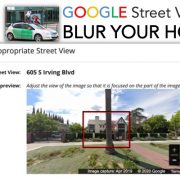How to keep your home address private
 The information on a deed is usually publicly available. This makes it easy to look up who owns a property and to know where someone lives. The article that follows was written by an attorney who helps celebrities and public figures keep their home address private. Since the Internet provides quick and easy access to vast amounts of personal data for everyone, you don’t have to be rich or famous to be found online or to want your personal data to be less accessible. As such, when reading how public figures and celebrities can achieve privacy, think of yourself because like it or not, thanks to the Internet, we are all public figures now.
The information on a deed is usually publicly available. This makes it easy to look up who owns a property and to know where someone lives. The article that follows was written by an attorney who helps celebrities and public figures keep their home address private. Since the Internet provides quick and easy access to vast amounts of personal data for everyone, you don’t have to be rich or famous to be found online or to want your personal data to be less accessible. As such, when reading how public figures and celebrities can achieve privacy, think of yourself because like it or not, thanks to the Internet, we are all public figures now.
People who are at risk due to easily accessible home addresses:
- Victims of crime: stalking, identity theft, rape, domestic violence, assault.
- Individuals whose profession exposes them (and their families) to potentially dangerous people: Law enforcement officers, attorneys, especially criminal attorneys, correction facility workers, judges, educators, mental health workers, and more.
Miscellaneous points to consider:
- The information in this article can be applied to properties and assets beyond personal residences.
- The way one takes title to a property is governed not only by a desire for privacy, but also by estate planning purposes which can have significant financial consequences. Therefore, before purchasing property, do research that takes both privacy and estate planning into account.
- Since privacy and estate planning options vary from state to state, please insure that anyone you hire is well versed in the laws and options in the state in which your property resides.
Above Introduction by Hayley Kaplan
The Use and Implementation of Privacy Trusts for Public Figures
An everyday problem celebrities, public figures and other well-known individuals face is the protection of their privacy. And one of the most important facts to keep private is, of course, the location of their personal residences. While there are several methods one could use to learn the whereabouts of a public figure’s personal residence (some less scrupulous than others), perhaps the easiest method is to simply search the public real estate records for the individual’s name.
There are several ways to keep one’s home address private. One method planners use to attempt to keep this information private is a privacy trust sometimes called a fictitious trust or blind trust. A privacy trust is similar to a standard revocable living trust, except that the name of the public figure is not in the title of the trust, nor is the public figure the trustee (at least initially). As part of a complete estate plan, the public figure (let’s call him John Smith) will have the John Smith Living Trust (as the revocable trust to hold the bulk of his property) and, for example, the 123 Main Street Trust (the privacy trust). The privacy trust, not surprisingly, only holds title to John Smith’s personal residence at 123 Main Street. Of course, if the public figure is especially creative, he or she can name the privacy trust anything he or she wants, even if wholly unrelated to the location of the property; just avoid naming it something the public could easily connect to the public figure.
When a public figure purchases a home, it should be purchased in the name of the privacy trust and by the trustee of the privacy trust. If the trustee is someone other than the public figure, the public figure’s name will not appear on the public records of that real estate transaction. The trustee should be someone who is trustworthy, but not someone who can be immediately linked by the public to the public figure in question.
For a privacy trust to be most effective, the public figure should undertake this method of planning before the property is purchased. However, if the public figure already owns the property with his or her name on the title, a privacy trust can still offer some modest privacy protection, although it becomes more challenging. In the case where the property is already owned by the public figure, the public figure may create two privacy trusts. The public figure will transfer the property to the first privacy trust, which will remove him or her from the grantee index. Sometime thereafter, the trustee of the first privacy trust should transfer the property from the first privacy trust to the second privacy trust, which should have a different name and different trustee. After this transfer, the public figure’s name will be removed from the grantor index. However, this method is not foolproof, as the public figure’s name will remain on historical records for the property.
As mentioned above, the trustee initially should be someone trustworthy and someone that the public cannot immediately connect to the public figure. Once the property is purchased and the transaction has become a matter of public record, if desired, the trustee can resign in favor of the public figure as trustee. If this occurs, then this change in trustee should not be recorded.
In addition to the above, it is important for a public figure to have a comprehensive privacy plan in place, where the privacy trust would serve as one tool in the privacy protection toolbox. The Taxation, Trusts and Estates group of Jeffer Mangels Butler & Mitchell LLP routinely implements privacy trusts for its well‑known clients as part of a complete estate plan. Generally, if there are no significant complications, a privacy trust can be drafted and implemented at a cost of between $5,000 and $7,500.
Please contact Bradford S. Cohen, Esq., or anyone else in the JMBM Taxation, Trusts and Estates group, for more information on privacy trusts.
————————-
 Brad Cohen is a Taxation and Trusts & Estates attorney at Jeffer Mangels Butler & Mitchell LLP. His practice emphasizes business planning related to complex corporate and partnership transactions, including mergers and acquisitions, financing and business succession planning, income tax planning, and estate tax planning, all on an integrated basis. Brad is best known for his business and tax advice related to the motion picture, television, music, emerging media and sports industries.
Brad Cohen is a Taxation and Trusts & Estates attorney at Jeffer Mangels Butler & Mitchell LLP. His practice emphasizes business planning related to complex corporate and partnership transactions, including mergers and acquisitions, financing and business succession planning, income tax planning, and estate tax planning, all on an integrated basis. Brad is best known for his business and tax advice related to the motion picture, television, music, emerging media and sports industries.






Hayley, As always such terrific and informative information. You always enlighten us with new ways to protect our privacy which is so important to protect not only privacy but safety!
🙂 Thanks for the feedback, Stacey!
Hayley, this is great!
We, the consumers, readers, etc truly appreciate you and the fact that you are willing to share your knowledge with us.
Thank you so very much!
p.s. please, if there is anything that I can do to assist please let me know as I do not know of very many people other than myself that have gone through so much hell dealing with collection agencies, credit bureaus and information brokers.
You are welcome. Thanks for the feedback and the offer to help too. It may seem like you are alone in the challenges you’ve faced but there are many people who are or who have been as frustrated as you when dealing with similar situations. Power on and best of luck! 🙂